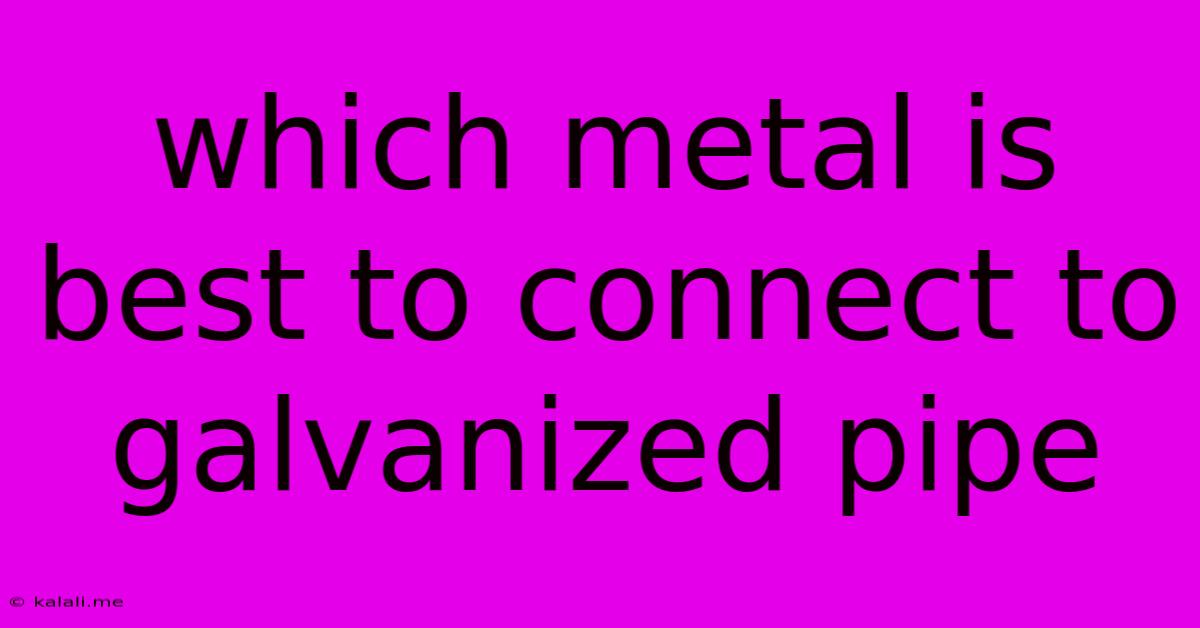Which Metal Is Best To Connect To Galvanized Pipe
Kalali
Jun 06, 2025 · 3 min read

Table of Contents
Which Metal is Best to Connect to Galvanized Pipe?
Choosing the right metal for connecting to galvanized pipe is crucial for preventing corrosion and ensuring a long-lasting, leak-free connection. Galvanized steel pipes, while durable, are susceptible to galvanic corrosion if paired with incompatible metals. This article will explore the best and worst choices for connecting to galvanized pipe, helping you make the informed decision necessary for your plumbing project.
Understanding Galvanic Corrosion:
Galvanic corrosion occurs when two dissimilar metals are in contact with each other in the presence of an electrolyte, like water. The more active metal (the anode) corrodes preferentially, protecting the less active metal (the cathode). With galvanized steel, the zinc coating acts as the anode, sacrificing itself to protect the underlying steel. Connecting the wrong metal can accelerate this process, leading to premature pipe failure and leaks.
Best Metals for Connecting to Galvanized Pipe:
The ideal choice minimizes the galvanic reaction and ensures a durable connection. Here are the top contenders:
-
Galvanized Steel: This is the most compatible option. Using galvanized steel fittings and connectors ensures a consistent metal composition, minimizing the risk of galvanic corrosion. This is generally the best choice for long-term reliability.
-
Black Iron Pipe: While not as readily available as galvanized steel, black iron pipe (also known as wrought iron) offers good compatibility. Its lower zinc content compared to galvanized steel reduces the potential for galvanic action.
-
Copper (with precautions): Copper is often used in plumbing, but its connection to galvanized pipe requires careful consideration. While it’s not ideal, a dielectric union – a fitting designed to electrically isolate dissimilar metals – can significantly mitigate the risk of galvanic corrosion. Always use a dielectric union when connecting copper to galvanized pipe.
Metals to Avoid Connecting to Galvanized Pipe:
Certain metals should be avoided due to their higher propensity to cause galvanic corrosion:
-
Aluminum: Aluminum is far more reactive than galvanized steel and will corrode rapidly when in contact. Avoid this metal at all costs.
-
Zinc: While galvanized steel has a zinc coating, direct contact with pure zinc can still contribute to corrosion issues. While not as problematic as aluminum, it's still not ideal.
-
Stainless Steel: While stainless steel is known for its corrosion resistance, its interaction with galvanized steel can still lead to some level of galvanic corrosion. Although not as severe as aluminum, it's best to prioritize galvanized steel or black iron when possible.
Choosing the Right Connectors:
Regardless of the metal chosen, proper installation techniques are paramount. Use threaded connections, ensuring clean threads and proper sealing with Teflon tape or pipe dope. Avoid relying solely on compression fittings, as these can create stress points and increase the risk of leaks. Always inspect connections regularly for any signs of corrosion or leakage.
In Summary:
For the most reliable and long-lasting connection to galvanized pipe, galvanized steel fittings are the best choice. Black iron pipe is a suitable alternative. While copper can be used with a dielectric union, it's essential to minimize direct contact with galvanized steel. Avoid aluminum and other highly reactive metals completely. By carefully selecting the appropriate metal and employing proper installation techniques, you can ensure a durable and safe plumbing system.
Latest Posts
Latest Posts
-
Create Or Replace Materialized View Postgres
Jun 07, 2025
-
Its Not An Argument If It Doesnt Have
Jun 07, 2025
-
Do Elephant Ears Need Full Sun
Jun 07, 2025
-
How To Rotate A Google Map
Jun 07, 2025
-
Do You Need To Use Cement For Steel Post
Jun 07, 2025
Related Post
Thank you for visiting our website which covers about Which Metal Is Best To Connect To Galvanized Pipe . We hope the information provided has been useful to you. Feel free to contact us if you have any questions or need further assistance. See you next time and don't miss to bookmark.